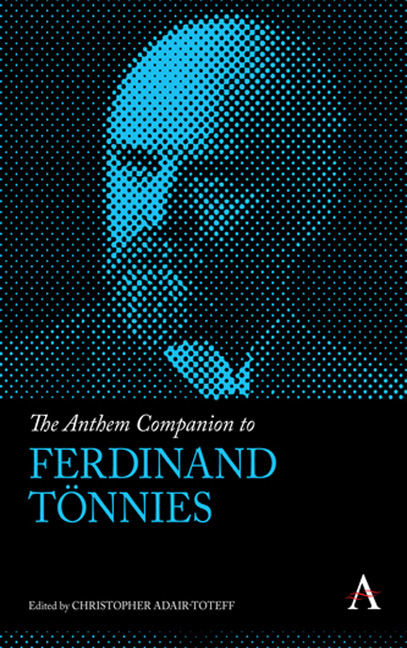Book contents
- Frontmatter
- Contents
- Introduction
- Chapter One Ferdinand Tönnies and the Development of Sociology
- Chapter Two Ferdinand Tönnies and Georg Simmel
- Chapter Three Whither Gemeinschaft: Willing and Acting Together as
- Chapter Four Tönnies and Globalization: Anticipations of Some Central Concerns of Twenty-First Century Sociology
- Chapter Five From Metropolis with Love: Tönnies, Simmel and Urban Social Architecture
- Chapter Six Ferdinand Tönnies: Hobbes Scholar
- Chapter Seven Gender and Family
- Chapter Eight The Power and Value of Public Opinion as a Form of Societal Will
- Chapter Nine The Politics of Ferdinand Tönnies
- Chapter Ten Crime and Law in Gemeinschaft und Gesellschaft
- Contributors
- Index
Chapter Six - Ferdinand Tönnies: Hobbes Scholar
Published online by Cambridge University Press: 22 July 2017
- Frontmatter
- Contents
- Introduction
- Chapter One Ferdinand Tönnies and the Development of Sociology
- Chapter Two Ferdinand Tönnies and Georg Simmel
- Chapter Three Whither Gemeinschaft: Willing and Acting Together as
- Chapter Four Tönnies and Globalization: Anticipations of Some Central Concerns of Twenty-First Century Sociology
- Chapter Five From Metropolis with Love: Tönnies, Simmel and Urban Social Architecture
- Chapter Six Ferdinand Tönnies: Hobbes Scholar
- Chapter Seven Gender and Family
- Chapter Eight The Power and Value of Public Opinion as a Form of Societal Will
- Chapter Nine The Politics of Ferdinand Tönnies
- Chapter Ten Crime and Law in Gemeinschaft und Gesellschaft
- Contributors
- Index
Summary
Introduction
The scholarly literature on Ferdinand Tönnies as one of the founders of classical sociology normally mentions the fact that he was also an intellectual historian who contributed significantly to the development of Hobbes scholarship, and whose interest in Hobbes might have influenced some of his own ideas. Likewise, the scholarly literature on Hobbes normally contains references to Tönnies's name, usually as an editor of Hobbes's manuscripts. In neither case, however, is Tönnies's work on Hobbes investigated in detail; in fact, it scarcely earns a nod. The few publications on this subject (see Bond 2011; Ilting 1971; Merle 2005), valuable though they are, limit themselves to specific matters such as Tönnies's liberal interpretation of Hobbes's politics, his early writings on Hobbes or his approach to Hobbes's notions of morality and natural law. The purpose of this chapter is to help fill this scholarly lacuna by offering a more comprehensive exposition of the subject. I believe that without doing so we cannot properly appreciate Tönnies's role in the development of twentieth-century Hobbes scholarship, or the evolution of his own thought.
Tönnies's Research on Hobbes
Tönnies spent the winter semester of 1875/76 at the University of Berlin, taking classes in philosophy with Friedrich Paulsen, who very quickly became not only his spiritual mentor but also a close friend. It was Paulsen who first drew the 20-year-old Tönnies's attention to the philosophy of Thomas Hobbes, a recommendation that would have great impact on Tönnies's future intellectual development. He became so interested in Hobbes's ideas that a year after his graduation, in the summer of 1878, he traveled to England to study the philosopher's unpublished writings. Among the manuscripts kept in the library of the British Museum he found one he identified as the original version of The Elements of Law, dated 1640. The two parts of this work had hitherto been known as two separate books, published without Hobbes's permission in 1650. Tönnies also discovered a manuscript that he named A Short Tract on First Principles (Hobbes 1969a, 193–210), attributing its authorship to Hobbes and dating it to circa 1630. From London he traveled to Oxford…
- Type
- Chapter
- Information
- The Anthem Companion to Ferdinand Tönnies , pp. 119 - 140Publisher: Anthem PressPrint publication year: 2016



